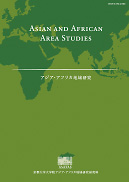最新号
選択された号の論文の6件中1~6を表示しています
- |<
- <
- 1
- >
- >|
論文
-
2024 年 23 巻 2 号 p. 177-212
発行日: 2024/03/31
公開日: 2024/04/09
PDF形式でダウンロード (3363K) -
2024 年 23 巻 2 号 p. 213-259
発行日: 2024/03/31
公開日: 2024/04/09
PDF形式でダウンロード (3746K)
研究ノート
-
2024 年 23 巻 2 号 p. 260-276
発行日: 2024/03/31
公開日: 2024/04/09
PDF形式でダウンロード (835K) -
2024 年 23 巻 2 号 p. 277-292
発行日: 2024/03/31
公開日: 2024/04/09
PDF形式でダウンロード (904K)
書評
-
2024 年 23 巻 2 号 p. 293-311
発行日: 2024/03/31
公開日: 2024/04/09
PDF形式でダウンロード (938K)
フィールドワーク便り
-
2024 年 23 巻 2 号 p. 312-336
発行日: 2024/03/31
公開日: 2024/04/09
PDF形式でダウンロード (6942K)
- |<
- <
- 1
- >
- >|
